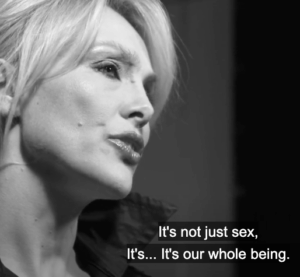We all sell something. Whether it’s a service, a product, an idea—or simply ourselves in a job interview. But the way we see ourselves when we do it (our “role”) can either open doors or quietly close them before we’ve even knocked. This article explores why the role we unconsciously step into when selling might be the very thing standing between us and our next big step.
Selling Isn’t Just a Skill—It’s a Story
And the Story Might Be Telling You to Play Small. Here’s How to Stop Self-Sabotaging.
Imagine this: two people offer exactly the same service. One says, “Oh, I just help with social media. Nothing fancy.” The other says, “I help brands connect with their audience in ways that feel honest and human.” Same thing. Different role. Different result.
We often think of selling as a technique—copywriting, funnels, webinars—but before all that, there’s the quiet story playing in our head. Who are we being when we show up to sell?
Are You the “Humble Doer”? Or the “Unremarkable Entrepreneur”?
Let’s be honest. Most of us carry around roles that are so familiar, we barely notice them anymore. Here are some classics:
The Humble Doer. “I’m just doing my best, there are so many others like me…”
The Over-Apologetic Creative. “I mean, I know this isn’t perfect but…”
The Invisible Expert. (Does amazing work. Tells no one.)
The Self-Sabotaging Star. Gets attention, freaks out, disappears. A classic case of belief-based self-sabotaging: deep down, there’s a story that says “visibility isn’t safe,” or “success will cost me too much.”
We perform these roles not because we want to—but because they feel safe. They protect us from the risk of fully owning our work. From being “too much.” From failing publicly.
But here’s the problem: these roles are not just performances. They’re filters. They quietly shape what we think we deserve. They tell us what kind of money we’re “allowed” to earn. What kind of clients we attract. What opportunities we assume are “not for us.”
Why We Turn Down Good Offers (Without Realizing It)
A little story, if you’ll indulge. Let’s say someone offers us an amazing opportunity: a higher-paying role, a chance to lead a team, an invitation to speak at an event.
What happens next?
We might find ourselves saying something like:
“It’s not really my thing.”
“I don’t think I’m ready.”
“It sounds great, but it’s just… not me.”
Ah. Not me.
But who is “me,” exactly?
Often, it’s not that we don’t want the opportunity. It’s that we’ve been living inside a role for so long—one where we’re not the kind of person who leads, speaks, charges that much, or takes up that kind of space—that when something outside that role appears, we flinch. And retreat.
A Quick Experiment: Reverse-Engineer Your Role
Try this simple reflection:
When was the last time you said “no” to something that, objectively, looked like a great opportunity?
Really think about it. What came up?
Did you tell yourself it was too soon? That someone else could do it better? That you’re “not that kind of person”?
Now ask:
If that opportunity found you—why did it think you were ready, even if you didn’t?
Sometimes the world sees us more clearly than we see ourselves.
What’s the Real Block? (Hint: It’s Not Skills)
Many of us believe we need to learn more before we can grow. More certifications, more clients, more clarity.
But often, the block is not about knowledge. It’s about identity. This is the hidden architecture of belief based self sabotaging—those quiet, internal scripts that say “not yet,” or “not me,” even when the world is offering a loud yes.
Here are a few questions to gently shake that tree:
Who are you being when you sell? (A helper, a fixer, a secret genius, a rebel, a dreamer?)
Who are you not allowed to be? (Bold, expensive, visible, powerful?)
What do you do, consciously or unconsciously, that cancels out your own efforts?
What’s your relationship with money—really? Is it polite? Awkward? Flirtatious but non-committal?
If a version of you who’s already successful looked at your current choices—what would they change?
These aren’t easy questions. But they’re the kind that don’t just change how we sell. They change how we show up.
So, What Now?
No, I’m not saying it’s all mindset and you should just “think positive.” Roles are complex. They’re shaped by family, culture, past experiences. They often kept us safe at some point.
But we can choose to update the script.
Try experimenting. Say one thing in your next client call that feels 10% bolder than usual. Charge a little more than feels “comfortable.” Share a story where you’re not the underdog, but the one who figured it out.
Tiny risks. But they accumulate. They build a new version of “me.” One that can receive what the world is actually trying to offer.
…and a Not-So-Obvious Invitation
If anything in this article made you raise an eyebrow or whisper “hmm” into your tea, that’s already a sign.
It means there’s a part of you that’s listening. That might be ready to play a bigger role. Not in the dramatic, performative sense. But in the quiet, grounded, deeply personal way.
And if that version of you needs a companion—someone to help unravel the role you’ve outgrown and step into the one that’s actually yours—I’d be honoured to walk beside you.
Sometimes, the most powerful transformation doesn’t start with a strategy.
It starts with the right question. Contact me here,
yours, Ksenia Trefilova.




